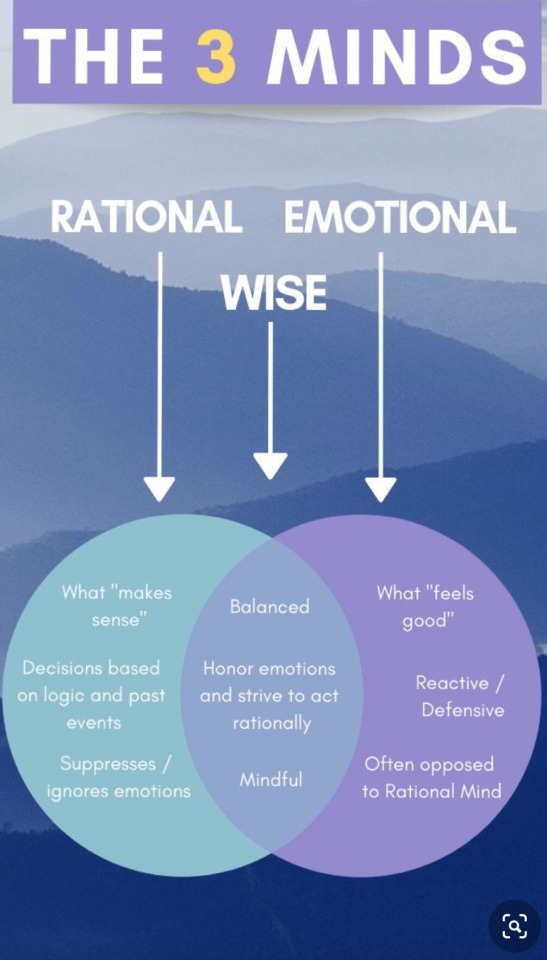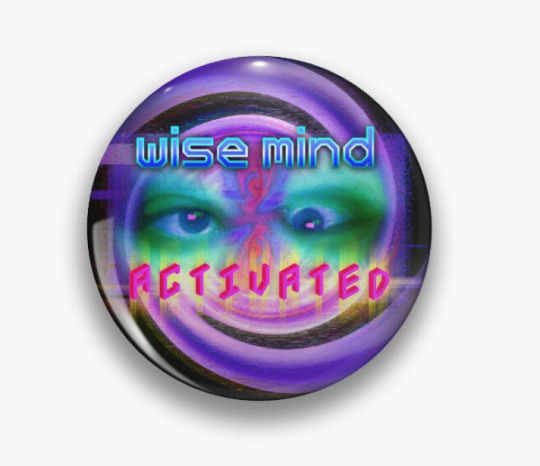#wise mind
Text

#possum#possuem#wisdom#wise mind#advice#solid advice#its the truth#sad but true#so true#raw truth#dark comedy#darkhumourmemes#dark memes#dark humor#dank humor#dankmemes#dank meme#dank memes#dank af#lol memes#memes#meme#fresh memes#funny meme#funny memes#relatable memes#stolen memes#shitpost#shitposting#lol wtf
996 notes
·
View notes
Text
I’m frequently asked about different DBT skills, so I think that I will start sharing about the different skills when I can.
The first one I’ll talk about, that I find really useful, is the Wise Mind Skill. (This is a mindfulness skill)
The goal of this skill is to balance your emotional mind and your reasonable mind. What this means is that we tend to get stuck on one extreme end of the spectrum and make decisions based on emotions, or just straight facts and disregard our emotions. Both of these can carry their own problems. For example, disregarding our emotions usually just leads to burying them and them surfacing in other ways that can make things harder. Making decisions based on emotion can sometimes have hurtful effects to yourself and/or someone else.
Here are some questions you might ask yourself:
What is the problem that’s on my mind?
Example: My partner and I had a miscommunication.
What do I feel like doing?
Example: I feel like breaking up with them, or yelling at them, or saying mean things to them.
What feeling is this urge representing?
Example: This urge is representing me feeling insecure.
What are other ways to meet my emotional needs?
Example: Using my coping skills. (This varies person to person, for some this might be journaling, going for a walk, re-reading text messages where they've told you they love you, etc).
What is the rational/logical thing to do?
Example: The rational thing to do is realize it’s a miscommunication and move on.
What am I choosing to do? (Should take into account rational consequences/benefits, but should also honour feelings.)
Example: I am going to talk to my partner about why I’m feeling insecure and ask for reassurance in a healthy way.
414 notes
·
View notes
Text
Things I hate that mental health professionals should stop using:
Metaphors
Fluorescent lighting
Shitty DBT skill packets
#dbt#dbt skills#flourescent#fluorescent lights#fluorescent lighting#metaphor#metaphors#therapy#mental health#hospitals#psych ward#figure of speech#wise mind#is bullshit
10 notes
·
View notes
Text
The farther I come from the need to belong, the greater is this sense of freedom. A range of souls I explored to find myself a safe space to build a home, home I finally found in the strangeness of solitude. People like me aren't the ideal kind to adore. Made of unseen stories, we are designed to be homeless, to live like a nomad in this round abode.
-Sabina Yesmin
#aesthetic#spilled ink#spilled thoughts#writeblr#writers on tumblr#my words#poem#my writing#quotes#positivity#sabina yesmin#sabinayesmin#wise mind#wise sayings#dark academia books#academia quotes#dark academism#tumblr aesthetic
17 notes
·
View notes
Text
he loves me wholeheartedly and safely, i am happier and better with him than ever before. i promise i know that, drunk and disordered is just a rough place to be sometimes
3 notes
·
View notes
Text
Today my therapist was like "hey friendo we can't move on to the next dbt section if you don't practice practice practice" and I'm
1. embarrassed because this has been an issue for me in therapy for years, I will work really hard as long as someone is in the room with me but when left to my own devices I start to spiral/panic/avoid EVERYTHING therapeutic and helpful because it is a reminder that I am broken
2. trying not to be judgmental of myself because that's LITERALLY ONE OF THE STEPS I'M SUPPOSED TO BE PRACTICING
3. desperate
If anyone has any hints/tips on practicing Distracting with the whole ACCEPTS (Activities, Contributing, Comparisons, Emotions, Pushing away, Thoughts, Sensations) I could very very use it
#dbt#dbt skills#borderline personality disorder#avoidant personality disorder#mental health#bpd#therapy#therapist#wise mind#marsha marsha marsha#dialectical behavior therapy#tw mental health#coping#coping skills#mental health support
3 notes
·
View notes
Link
Here is my latest blog post! It talks about the Wise Mind DBT skill which is useful for several situations.
If you liked the article, please “heart” it (on the site itself). This lets me know of how many views, how many people thought it was a good read or helpful. (It’s totally anonymous and I can’t see anything about you if you click the heart on the article.)
You also don’t need to login or anything like that to view posts on this site. And there are no pop ups asking you to subscribe or anything. It’s my own website and I keep it as simple and safe as possible.
55 notes
·
View notes
Text

Wise Mind is the state of mind where the Reason side of your mind and the Emotion side of your mind, work together
Reasonable mind or the reason side of your mind is all about logic and hard facts and is task-focused.
Emotion mind (emotion side of mind) is all about those emotions and feelings, and ruled by urges.
Combining them in Wise Mind means seeing both sides and recognizing their value, then acting or existing in that balance where they work together. Think of it as finding the best of both worlds.
This requires a whole lot of active practicing before it can become habit.
Another way to look at Wise Mind is the middle path between being and doing. Being mind is present oriented, while Doing mind is goal oriented/
Some ways to practice Wise Mind:
-when making decisions take note of which mind is making the decision, or is the strongest factor.
-when presented with a problem, make a chart or Venn-diagram and note what thoughts/feelings/urges you are having and which mind they fall under. Then think about how to combine them into wise mind.
-general meditation and mindfulness activities will help with this awareness as well Wise Mind is the state of mind where the Reason side of your mind and the Emotion side of your mind, work together
Reasonable mind or the reason side of your mind is all about logic and hard facts and is task-focused.
Emotion mind (emotion side of mind) is all about those emotions and feelings, and ruled by urges.
Combining them in Wise Mind means seeing both sides and recognizing their value, then acting or existing in that balance where they work together. Think of it as finding the best of both worlds.
This requires a whole lot of active practicing before it can become habit.
Another way to look at Wise Mind is the middle path between being and doing. Being mind is present oriented, while Doing mind is goal oriented/
Some ways to practice Wise Mind:
-when making decisions take note of which mind is making the decision, or is the strongest factor.
-when presented with a problem, make a chart or Venn-diagram and note what thoughts/feelings/urges you are having and which mind they fall under. Then think about how to combine them into wise mind.
-general meditation and mindfulness activities will help with this awareness as well
#coping skills#mental health#mental help#coping#mental heath support#coping strategies#self improvement#dbt skills#improve mental health#mental health tips#mindfulness#wise mind
22 notes
·
View notes
Text
Trying not to get stuck in my head, running through everything that was said. Oh I should have said this differently. Oh I shouldn’t have said it in that way. On and on.
Because a) it’s done and past, can’t change it, b) it went as well as it could, and c) I was honest and upfront, keeping to my script, trying to remain as caring as possible. I did the best that I could in a difficult situation that needed to happen. I feel bad, but not regretful. If that is the right word. The bad feelings were going to happen regardless and I know I made the right decision for myself and supported my needs.
Hey, look at me being all self-compassionate (and probably using Wise Mind in some way) 😬
6 notes
·
View notes
Text
I love the freedom to make choices based purely on emotion rather than logic. In a way, by making these extremely questionable, extremely human life choices, I am fighting against AI
4 notes
·
View notes
Text



wise mind thinking cap and pins
#weirdcore#mental health#dreamcore#kidcore#oddcore#nostalgiacore#cringecore#sadcore#traumacore#ventcore#eyes#wise mind#therapycore#bokh zmur#artists on tumblr#queer artist#small shop#strangecore#liminal
3 notes
·
View notes
Note
DBT skills question. I figure out my emotions, I'm calm, and recognize what reality is. Outside of how I feel (internal conflict), how do I determine if something is an issue.
For example. A friend overstepped a silent boundary. I take my time, let go of my blank and white thinking, and don't react in an emotional way.
Something about it still bothers me though.
How can I tell if I need to double down on the DBT skills? Or, if it's something I need to sit down with this friend and talk to them about?
It's not something big, just something small. But... What's small enough to talk to someone about? What's the line there? Maybe I'm thinking black and white again, and there is no line, but I still feel very unsure in my judgement. (That could also be because I'm very very new to thinking dialectically)
-Lawfullyhopeful
Hello!
This can definitely get tricky, and it's a very valid and understandable question.
There's no set rule that works for everyone, and this is one of those things that I think isn't so black and white as having a "set line." However, I do think overstepping boundaries does sound like something to talk to someone about.
My general rule to myself is if something still bothers me when I'm calm, it's fair to talk about in a healthy way. Even if someone hasn't technically done something wrong, it can still be helpful to sort out. (For example, my partner said something earlier that wasn't meant to upset me and was very much my interpretation and BPD acting up. I waited until I was calm and it still bothered me. I ended up approaching him and assuring him that it wasn't his fault, but I wanted to talk about it. Talking about it helped me "release" the feelings, get validation and move on.)
And even if it's "small", you deserve to have your boundary respected. I'm not sure if silent means they don't know about the boundary? If that's the case, then I'd approach the conversation with a significantly more gentle tone as that could genuinely be not knowing. If someone knowingly steps over your boundaries, no matter how "small", that's not okay. And you're allowed to have feelings and want to have those boundaries respected.
One of the ways I best figure out things is that I have some close friends who have consented to me coming to them with situations and emotions that are confusing to me to give me an outside perspective. This can really help me figure stuff out.
For stuff like this, I think the Wise Mind skill is super useful. I wrote a post on this here. Because it sounds like (sorry, this is just a short ask and I'm making an assumption, so please ignore me if I'm wrong), that you're so hung up on not acting emotionally, that you may be disregarding your emotions unintentionally. Wise Mind is about finding a balance between rational mind and emotional mind, and making a decision that respects both.
(Also, sorry if this is weird but I just want to say I'm super proud of you! By the wording in this ask, I can tell that you're really trying and making progress. And I think that's wonderful and that you're doing a great job.)
21 notes
·
View notes
Text
DBT: TIPP Skill
This is a 3 minute video. I'm sharing a few different things that help me when I'm dealing with anxiety, in CPTSD mode, or feel an incoming panic attack.
I filmed a TikTok video mentioning a few things that I do to help myself when I’m caught up in anxiety.
This is a great article
And here is another one.
I’m also sharing this video series about anxiety & depression from a spiritual perspective.

View On WordPress
#anxiety#anxiety tips#CPTSD#DBT#DBT Therapy#grounding#help for anxiety#intrusive thoughts#Mental Health#mind body connection#mindfulness#My Journey#overwhelmed#panic attacks#PTSD#therapy works#wise mind
2 notes
·
View notes
Text
The ants eat the anteaters when time flips the coin. There's a message in it for the ones who pay attention.
Sabina Yesmin
#aesthetic#spilled ink#spilled thoughts#writeblr#writers on tumblr#my words#poem#my writing#quotes#positivity#deep qoute#words of inspiration#wordsofwisdom#wise sayings#wise mind#lifequotes#academia quotes#dark acadamia quotes#dark academia#dark acadamia aesthetic
13 notes
·
View notes
Text
How to Make Peace With Your Fear
How to Make Peace With Your Fear
Begin by Listening to Your Body Using Your Wise Mind
When it comes to making decisions it can become easy to feel conflicted about a particular decision or action, if we listen careful enough our bodies will hold the answer to our true discernment. In dialectical behavioral therapy, this ‘bodily intuition’ is called the ‘wise mind.’ in therapeutic speak, a mindful awareness of emotions, or…

View On WordPress
3 notes
·
View notes
Text

- TAGLIST:
#the dog = irl self tag
#lover boy = fiance tag
#hound in heat = nsfw tag
#therapy session = vent tag
⤷ specific triggers will be tagged; ask me to add a tag
#the mailman = asks and anons
#scrapbook = non self irl tag
#photo gallery = non irl images
#dogbrained = therian/otherkin tag
#patient chart = medical posting
#wise mind = post vent clarity
#false p(r)o(ph)et = my own writing
#wedding bells = wedding planning
#the dog#lover boy#hound in heat#therapy session#the mailman#scrapbook#photo gallery#dogbrained#patient chart#wise mind#false p(r)o(ph)et#wedding bells
1 note
·
View note